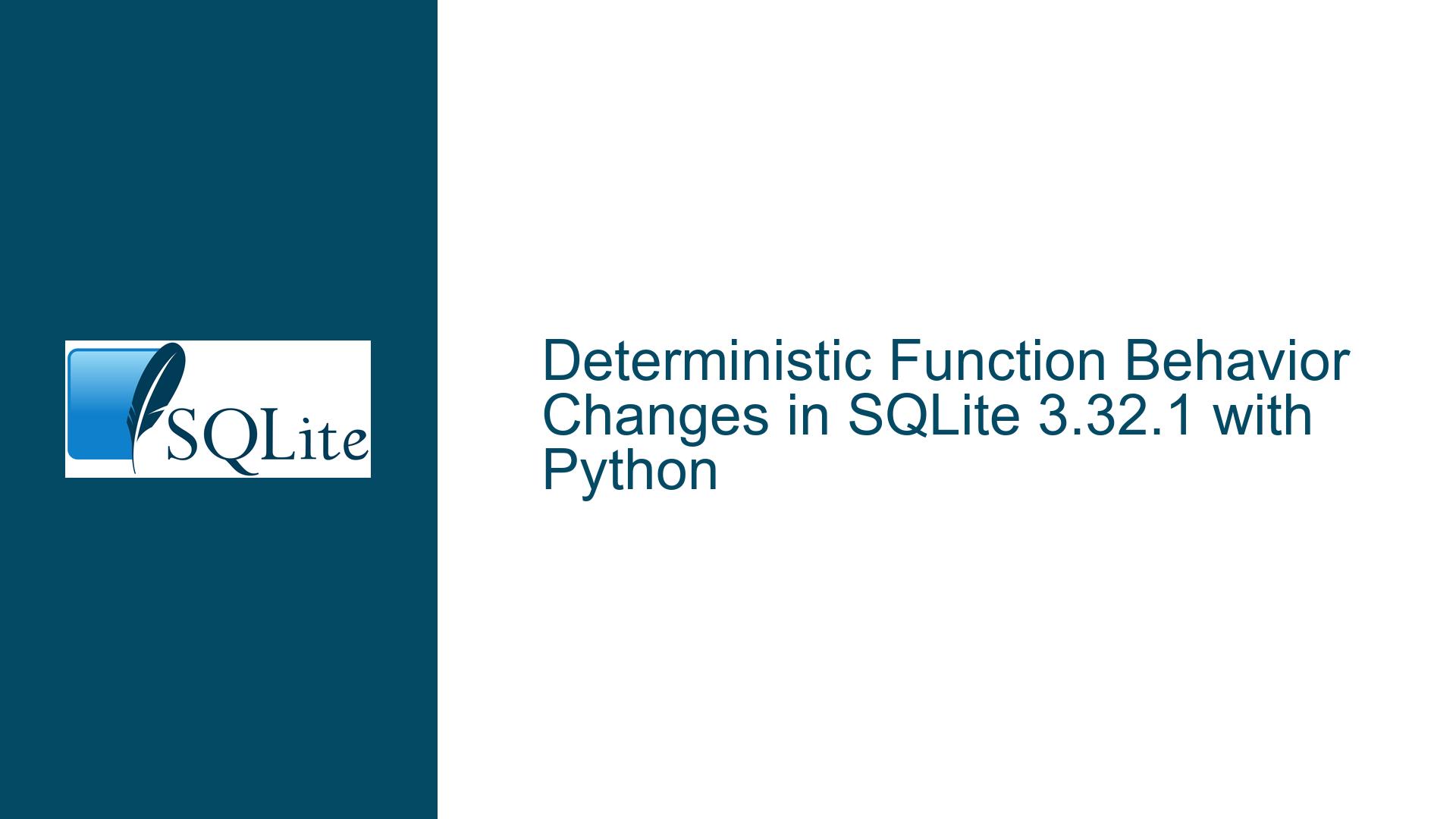Deterministic Function Behavior Changes in SQLite 3.32.1 with Python
Deterministic Function Calls Trigger Multiple Executions in SQLite 3.32.1
In SQLite 3.32.1, a significant change in the behavior of deterministic functions has been observed, particularly when interfacing with Python via the sqlite3 module. Deterministic functions, which are expected to return the same result for the same inputs and are often optimized to avoid redundant calls, are now being executed multiple times in scenarios where they were previously called only once. This behavior is particularly evident in the CheckFuncDeterministic test case, where a mock function marked as deterministic is called twice despite being expected to execute only once. This issue has implications for performance and correctness, especially in applications relying on the deterministic property for optimization.
The core of the problem lies in the interaction between SQLite’s query planner and the Python sqlite3 module. The SQLITE_DETERMINISTIC flag, which is set when a function is marked as deterministic, is intended to inform SQLite that the function’s output is consistent for identical inputs. However, in SQLite 3.32.1, this flag no longer guarantees that the function will be called only once, even when the inputs are identical. This change is rooted in a modification to how SQLite handles constant function evaluation, which was introduced in version 3.32.0.
Constant Function Evaluation Changes in SQLite 3.32.0
The behavior change in SQLite 3.32.1 can be traced back to a specific update in SQLite 3.32.0, where the evaluation of constant functions was moved from the query preamble to a "once" block. This modification was intended to improve the handling of short-circuiting in conditional expressions, such as those involving COALESCE and CASE statements. By deferring the evaluation of constant functions until they are explicitly needed, SQLite aims to optimize query execution and reduce unnecessary computations.
However, this change inadvertently affects deterministic functions. Previously, deterministic functions marked with the SQLITE_DETERMINISTIC flag were evaluated during the query preamble, ensuring that they were called only once for identical inputs. With the new approach, deterministic functions are now evaluated in the "once" block, which can lead to multiple calls even when the inputs are the same. This behavior is particularly problematic for functions that perform expensive computations or have side effects, as it undermines the optimization benefits of marking a function as deterministic.
The issue is further compounded by the fact that the SQLite documentation does not explicitly guarantee that deterministic functions will always be called only once. While the SQLITE_DETERMINISTIC flag allows the query planner to optimize function calls, it does not enforce a strict single-call guarantee. This ambiguity has led to confusion and unexpected behavior, especially in applications that rely on deterministic functions for performance-critical operations.
Implementing Workarounds and Best Practices for Deterministic Functions
To address the issue of multiple calls to deterministic functions in SQLite 3.32.1, several workarounds and best practices can be implemented. These solutions aim to restore the expected behavior of deterministic functions while accommodating the changes introduced in SQLite 3.32.0.
Caching Function Results
One effective approach is to implement a caching mechanism for deterministic functions. By storing the results of function calls and reusing them when the same inputs are encountered, applications can avoid redundant computations and ensure consistent behavior. This can be achieved using a dictionary or a similar data structure to map inputs to their corresponding outputs. For example:
import sqlite3
from functools import lru_cache
@lru_cache(maxsize=None)
def deterministic_function(input_value):
# Perform expensive computation or operation
return result
connection = sqlite3.connect(":memory:")
connection.create_function("deterministic", 1, deterministic_function, deterministic=True)
In this example, the lru_cache decorator from the functools module is used to cache the results of the deterministic_function. This ensures that the function is only executed once for each unique input, regardless of how many times it is called within a query.
Using Subqueries or Common Table Expressions (CTEs)
Another approach is to refactor queries to use subqueries or Common Table Expressions (CTEs) to precompute the results of deterministic functions. By isolating the function call in a subquery or CTE, applications can ensure that the function is evaluated only once and its result is reused as needed. For example:
WITH function_result AS (
SELECT deterministic(1) AS result
)
SELECT result FROM function_result
UNION ALL
SELECT result FROM function_result;
In this example, the deterministic function is called only once within the CTE, and its result is reused in subsequent queries. This approach can be particularly useful for complex queries involving multiple function calls.
Leveraging SQLite’s PRAGMA Statements
SQLite provides several PRAGMA statements that can be used to influence query execution and optimization. While these PRAGMAs do not directly address the issue of multiple calls to deterministic functions, they can be used to fine-tune query performance and behavior. For example, the PRAGMA optimize statement can be used to analyze and optimize queries, potentially reducing the impact of redundant function calls.
PRAGMA optimize;
Additionally, the PRAGMA cache_size statement can be used to adjust the size of SQLite’s cache, which may improve performance for queries involving deterministic functions.
Monitoring and Profiling Queries
To better understand and address the impact of multiple calls to deterministic functions, it is essential to monitor and profile queries. SQLite provides several tools for query profiling, including the EXPLAIN QUERY PLAN statement and the sqlite3_trace function. These tools can be used to analyze query execution and identify opportunities for optimization.
EXPLAIN QUERY PLAN
SELECT deterministic(1) = deterministic(1);
By examining the query plan, developers can gain insights into how SQLite is executing queries and identify potential inefficiencies related to deterministic functions.
Updating Application Logic
In some cases, it may be necessary to update application logic to accommodate the changes in SQLite 3.32.1. This may involve revisiting the use of deterministic functions and considering alternative approaches for achieving the desired behavior. For example, applications that rely on deterministic functions for performance-critical operations may need to implement custom caching or memoization logic to ensure consistent performance.
Conclusion
The changes in SQLite 3.32.1 regarding the behavior of deterministic functions have introduced challenges for applications that rely on these functions for optimization. By understanding the underlying causes of these changes and implementing appropriate workarounds and best practices, developers can mitigate the impact of multiple function calls and ensure consistent performance. Whether through caching, query refactoring, or leveraging SQLite’s PRAGMA statements, there are several strategies available to address this issue and maintain the integrity of deterministic functions in SQLite.






